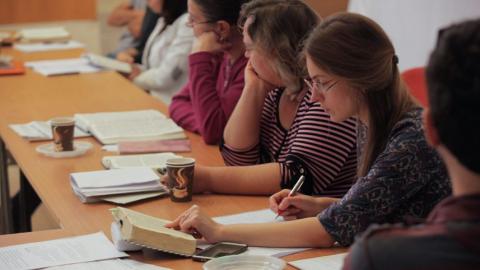Religious Zionist rabbis create alternative conversion court
The Babylonian Talmud (Sanhedrin 2b–3a) explicated situations in which experts are in short supply. The Talmud evokes the principle “not to lock the door in the face of people in need.” Instead, we judge that case with unlicensed learned people. Originally, this maxim was applied to facilitate readily available loans but authoritatively, Tosafot expands it to include a host of situations, amongst them divorce and conversion. Since it is unreasonable that such cases be denied resolution, the expert requirement is waived. Tosafot reads the biblical verse (Numbers 15:16), “One law for you and the convert (ger) . . . in all your generations (ledoroteichem),” emphasizing that conversion must take place ledoroteichem “in all your generations.” Thus it is intolerable to “lock the door in the face of converts” in any generation by insisting upon licensed experts.
Understanding this emphasizes the utmost important our faith assigns to making conversion accessible. Until now, the situation has been intolerable. The door to conversion has been locked, but not before it has been carefully and repeatedly slammed in the face of converts, bloodying their noses. This is painful for all of us, especially we Orthodox rabbis, when it is done to young potential converts. Indeed the Talmud asks how we can convert minors when they have no formed independent will. The Talmud (Ketuvot 11a) applies the well-known legal rule “we will credit (zokhin) a person even when he is not present” — that is, we can legally accept a positive thing for a person (think of the payoff for a lottery ticket or an inheritance) even if he is not present. A minor is “not present” to act for himself, but we can accept for him the zechut (credit) of becoming Jewish as long as his family or guardian requests it.
Indeed the court must do so. It is the moral thing to do. It is unbearable to lock this door. To become Jewish is a great zechut and in the words of the incomparable decisor Rabbi Moshe Feinstein (Belarus, New York 1895–1986) it is a zechut even if the child probably will not be religiously observant, for the child “enters the holiness of Israel.” It is dumbfounding that families bring children to the court know that being Jewish is a zechut while the rabbis deny that fact.
The Chief Rabbinate could, charitably, be seen by their desperate supporters as not recognizing the great harm and pain they cause the families and these children as they grow up. Having a household in which (some of) the children are not Jewish is alienating in the extreme. Further, most of the children – if not all – will in any event end up living with born Jews and it bedevils me why the Rabbinate desires the creation of mixed liaisons or marriages, whether or not those marriages are recognized by the state.
The Chief Rabbinate does not come from a sector of society that has need for conversion, in that blended families and adoptions are unusual. Certainly they aren’t immigrants from the former Soviet Union, nor their children. They neither feel the pain nor see the potential in Jews proud of their identity and eager to belong and to have their children belong.
The chief rabbis have mutinied from their duties to state and halakha. The rabbis of the new independent courts are no less experts, even if not officially licensed, than those slamming the doors. Yet, the independent courts provide hope for these families who are rediscovering the zechut in being Jewish. They act when the situation is morally and halakhically wrong. In Talmudic language, they are “doing the work and the mission” of early masters. We, Orthodox Jews in Israel, are lucky for the opportunity to support them.
Rabbi Daniel Landes

